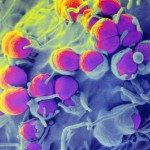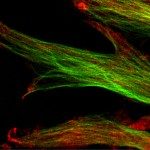Lien vers Pubmed [PMID] – 17875726
Cancer Res. 2007 Sep;67(18):8847-55
Targeting the human papillomavirus (HPV) E7 antigen to dendritic cells with the adenylate cyclase (CyaA) of Bordetella pertussis as a vaccine vector led to potent therapeutic immune responses against TC-1 tumors in a murine model of cervical carcinoma induced by HPV. However, as the time between tumor graft and vaccination increased, the antitumor efficacy of the CyaA-E7 vaccine gradually decreased. The vaccine had no effect if the tumor diameter was >8 mm. Analyses of regulatory cells recruited during TC-1 tumor growth revealed a high number of splenic MDSCs and a large percentage of regulatory T cells, particularly in the tumor. Administration of a tritherapy including CpG complexed with a cationic lipid, low-dose cyclophosphamide, and the CyaA-E7 vaccine completely overcame tumor-associated immunosuppression and eradicated large, established tumors in almost all treated animals. This strong antitumor response was followed by a large expansion of regulatory T cells in tumor, spleen, and tumor-draining lymph nodes and of splenic neutrophils. These findings indicate that immunotherapeutic strategies that simultaneously target innate, adaptive, and regulatory components of the immune system are effective in the eradication of large tumors.

